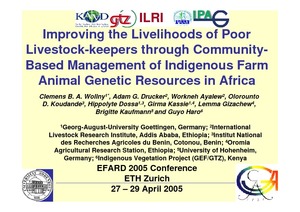Changing conflict resolution institutions in the Ethiopian pastoral commons:
Changing conflict resolution institutions in the Ethiopian pastoral commons:
the role of armed confrontation in rule-making
Wildlife Management and Village Land Tenure in Northern Tanzania
This paper explores and analyses contemporary contests over land tenure in
northern Tanzania’s village lands as they relate to wildlife management and land policy
and legislation. It details the nature of the contests and conflicts, including their legal
aspects, and further seeks to diagnose the underlying political economic reasons behind
these endemic conflicts. It concludes by relating these underlying issues to the broader
macroeconomic environment and efforts to improve the security of local land tenure in
Land Tenure, Land Use and Sustainability in Kenya: Towards Innovative Use of Property Rights in Wildlife Management
The report considers the different laws and policies relevant to wildlife management in Kenya, and critiques these in relation to conceptual and legal problems, ecological and institutional problems. It suggests a rethinking of property rights for wildlife management so that local communities can better benefit.
Kyrgyz Livestock Study. Pasture Management and Land Use.
The document provides a comprehensive study on past and current land management, including an overview of legislation on pasture access and management, and pratical examples of pasture management in practice.
Collective Action and Property Rights for Sustainable Rangeland Management
This set of research briefs present a summary of research work undertaken jointly by ILRI, IFPRI and the University of Gottingen. The research has the following objectives:
- To better understand how environmental risk affects the use and management of resources under various property rights regimes.
- To identify circumstances under which different pathways of change in land use and property rights are followed.
Exploring the Intricacies of Land Tenure in Pastoral Areas: Issues for Policy and Law Reform
This paper reviews, discusses and points issues relating to land tenure and their relevance to policy and legal reforms in Uganda. The fundamental argument on land tenure in the report is that pastoral production is determined by land use patterns which in turn determine whether the herders are mobile or not.
Rain, prosperity and peace
This report provides a record of the Global Pastoralist Gathering, an event which brought together more than 200 pastoralists and their supporters from 23 countries to raise the profile and voice of pastoralists in governance and policy processes around the world. In a series of short articles, the report sets out the perspectives of pastoralist leaders from countries in Africa, Asia, Europe and the Americas.There area number of key issues that were identified during the gathering which concern pastoralists around the world.
Plan de Acción Nacional de Lucha contra la Desertificación y la Sequía en Colombia.
El Plan de Acción Nacional de Lucha contra la Desertificación y la Sequía en Colombia es un instrumento de alcance nacional cuyo objetivo general es adelantar acciones contra la degradación de tierras, desertificación y mitigación de los efectos de la sequía, así como para el manejo sostenible de los ecosistemas de las zonas secas, a partir de la aplicación de medidas prácticas que permitan prevenir, detener y revertir dichos procesos degradativos y contribuir al desarrollo sostenible de las zonas afectadas.
Spatiotemporal mapping of the dry season vegetation response of sagebrush steppe
The vegetation dynamics of semi-arid and arid landscapes are temporally and spatially heterogeneous and subject to various disturbance regimes that act on decadal scales. Traditional field-based monitoring methods have failed to sample adequately in time and space in order to capture this heterogeneity and thus lack the spatial extent and the long-term continuous time series of data necessary to detect anomalous dynamics in landscape behavior.
Classification and description of the major farming systems incorporating ruminant livestock in West Africa
A classification of the major ruminant livestock production systems in West Africa is proposed. The proposed typology has two major classes of systems-sole livestock and crop-livestock. The sole livestock class has two systems (rangeland-based and landless) and the crop-livestock class has three sub-classes (annual crop-livestock, tree-crop-livestock and irrigated/flooded cropland-livestock). Within the 3 crop-livestock subclasses 13 systems defined by the dominant crops are identified.
Climate variability and impacts on East African livestock herders: The Maasai of Ngorongoro conservation area, Tanzania
East African pastoral adaptation and vulnerability to climate variability and climate change is assessed, using data from decision making processes and ecological data of the Maasai of Ngorongoro Conservation Area as an example. The paper uses integrated modeling, linking PHEWS, a household model, to SAVANNA, an ecosystem model to look at the effects of drought and a series of wet years on the well-being of Maasai pastoralists. Model results suggest that the ecosystem is quite resilient and suggests that the Maasai of the NCA are not very vulnerable to climate variability.






